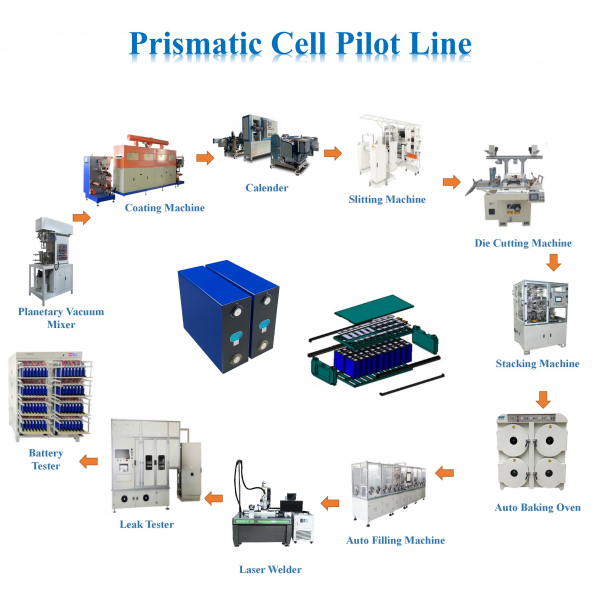Linea di macchine per la produzione di celle cilindriche automatiche
fabbricazione e attrezzatura del laboratorio della batteria agli ioni di litio 18650
diagramma di flusso delle celle a bottone agli ioni di litio ed elenco delle macchine
fabbricazione e attrezzatura del laboratorio della batteria del sacchetto dello Li-ione
- Posta elettronica : David@tmaxcn.com
- Posta elettronica : Davidtmaxcn@gmail.com
- : No. 39, Xinchang Road, Xinyang, Haicang Dist., Xiamen, Fujian, China (Mainland)
Introduction to Prismatic cell manufacturing line
The demand for high-performance lithium-ion batteries has been on the rise in various industries such as electric vehicles, portable electronics, and energy storage systems. To meet this demand, the prismatic cell assembly line plays a crucial role in efficiently and reliably producing prismatic lithium-ion battery cells. In this article, we will explore the key aspects of the prismatic cell assembly line, including its equipment, processes, production efficiency, quality control measures, flexibility, and technical support.
The Prismatic cell production line is a comprehensive production system designed to automate the manufacturing of prismatic lithium-ion battery cells. It comprises a series of specialized equipment and processes that ensure precise and consistent assembly of battery cells with high-quality standards. Let's delve into the key aspects of the prismatic cell assembly line.
Equipment and Processes:
The Prismatic cell pilot lab line involves several crucial equipment and processes. It starts with the electrode preparation, where the electrode materials (anode and cathode) are coated onto metal foils, dried, and calendared to ensure uniform thickness. Specialized coating machines, drying ovens, and calendaring equipment are used for this purpose. Next, the coated foils are slit into appropriate widths and lengths, and then stacked together with separator material to form the electrode stack. Automated slitting machines and stacking machines ensure accurate and efficient operations.
The electrode stack, along with the electrolyte and other necessary components, is assembled to create a prismatic cell. This assembly process involves precise alignment and sealing within a prismatic cell casing. Automated assembly machines ensure precise alignment, sealing integrity, and leak-free cell construction.
After assembly, the prismatic cells undergo electrolyte filling, where the appropriate electrolyte is injected into the cell casing. This is by a formation process that involves controlled charging and discharging cycles to activate and stabilize the cell's performance. Specialized equipment, such as electrolyte filling stations and formation chambers, are used for these steps.
Production Efficiency:
The prismatic cell assembly line offers significant improvements in production efficiency compared to traditional methods. Automated equipment operates at high speeds, ensuring fast and accurate assembly processes. The integration of advanced technologies and robotics minimizes human intervention, reducing labor intensity and minimizing human errors. The line's high processing capacity enables large-scale production to meet the growing demand for prismatic lithium-ion battery cells.
Quality Control Measures:
Maintaining consistent quality is of utmost importance in battery production. The prismatic cell assembly line incorporates comprehensive testing and quality control measures. The cells undergo electrical performance testing, capacity testing, impedance measurement, and safety testing to ensure their compliance with desired specifications. Automated testing equipment and monitoring systems are employed to assess and verify the cells' performance and quality.
Flexibility and Customization:
The prismatic cell assembly line offers flexibility and customization options to meet diverse customer requirements. It can be tailored to produce prismatic cells of various sizes, capacities, and specifications. The line's adjustable settings and scalability enable manufacturers to adapt to market changes and accommodate evolving customer demands. This flexibility ensures the production of customized prismatic cells for different applications.
Technical Support and After-Sales Service:
To ensure smooth operation and maintenance of the prismatic cell assembly line, comprehensive technical support and after-sales service are provided. Suppliers offer training programs, equipment maintenance support, troubleshooting assistance, and spare parts availability. Continuous production optimization and improvement suggestions are offered to help customers achieve maximum efficiency and productivity.
 English▼
English▼





 +86 13174506016
+86 13174506016 David@tmaxcn.com
David@tmaxcn.com

